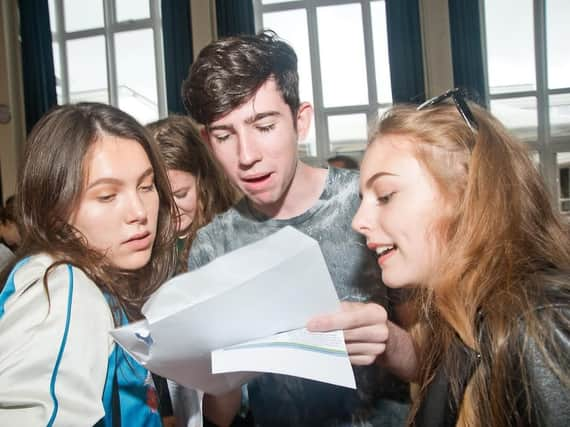Calls for re-think on university admissions


New data from UCAS, the University Clearing and Admissions Service, reveals the number of unconditional offers has rocketed over the last five years – 67,915 this year compared to 2,985 in 2013.
In the UK 18-year-olds have to apply to university before they have taken their final exams so receive offers pending results.
Advertisement
Hide AdAdvertisement
Hide AdWhen universities make an offer, it can either be conditional or unconditional. Conditional offers usually specify the grades a student needs to achieve in their A levels, BTECs, or other relevant qualifications, to be accepted onto a course.


Unconditional offers don’t have any further academic requirements the student needs to meet.
It is the first time that UCAS has analysed offer-making patterns during an application cycle and says its analysis is part of its ongoing commitments to “ensure transparency throughout the admissions process”.
The data comes as the cap on student admissions has been lifted and the population of 18-year-olds is falling.
Advertisement
Hide AdAdvertisement
Hide AdUniversities Minister Sam Gyimah branded the practice “Completely irresponsible to students.”


Geoff Barton, general secretary of the Association of School and College Leaders, said: “This huge increase in unconditional offers is driven by competition between universities and is not in the best interests of students.
“It can lead to students making less effort in their A-levels because their place is assured.”
University and College Union general secretary Sally Hunt want to see change in the way places are allocated.
Advertisement
Hide AdAdvertisement
Hide AdShe said: “The proliferation of unconditional offers is detrimental to the interests of students and it is time the UK joined the rest of the world in basing university offers on actual achievements instead of on guesswork.”
Lancaster University currently makes unconditional offers, UCLan is trialling a pilot and Cumbria is doing the same for exceptional students.
Edge Hill does not make unconditional offers.
A spokesman for UCLan says: “This year we have introduced an unconditional offer pilot programme involving 20 courses out of almost 300 for those students predicted to achieve or exceed the published entry tariff for that course.
“Personal statements and references will also be taken into account and, for some of these courses, an interview or portfolio will form part of the assessment.
Advertisement
Hide AdAdvertisement
Hide Ad“To incentivise students to perform well in their exams we have also offered a £500 scholarship for those who achieve or exceed 128 UCAS tariff points -ABB at A level.
“The number of offers made through this pilot programme represents 2.2 per cent of our overall offers to date, so is very small.
“We will evaluate the pilot’s impact in the coming year but ultimately our aim is to enrol motivated students who have worked towards their qualifications and achieved to the best of their ability.
“This approach helps make sure they are well prepared for their degree course and for future employment.”
Advertisement
Hide AdAdvertisement
Hide AdA Lancaster University spokesman adds:“Lancaster makes a small number of unconditional offers each year to applicants who have the strongest academic profiles.
“As the strength of our applicant group has grown, the number of applicants eligible for the scheme has risen.
“Our unconditional offers are linked to an excellence scholarship to encourage applicants to continue strive for the best possible grades in their exams.”
The University of Cumbria is considering unconditional offers for exceptional candidates for some subjects.
Advertisement
Hide AdAdvertisement
Hide AdAmanda Lane, director of student and academic administrative services, says: “We are piloting a new approach which we believe will work in the best interests of applicants, the university and future employers.”
“The university will work with students and our academics to tailor offers dependent on an applicants’ ability - a range of qualifications, experience and experiential learning will be considered on an individual basis alongside academic background, motivation and other interests.”
“This approach is, we believe, fairer and will enable us to build stronger links with the university’s outreach activities, schools, colleges and feeder schools.
“It will also mean the university is better placed to support mature learners keen to return to education with a broad range of experience.”
Advertisement
Hide AdAdvertisement
Hide Ad“The university already offers Guaranteed Grade Acceptance in certain subjects.
“This has aided university conversion in policing and performing arts whilst ensuring applicants still aim for their predicted grades and complete their level three study.”
When universities make an offer to prospective students it is either conditional or unconditional.
A conditional offer usually states the grades needed in A-levels, or other relevant qualifications before they are accepted on to a course.
Unconditional means the place is guaranteed regardless.
Advertisement
Hide AdAdvertisement
Hide AdUCAS says these unconditional offers have traditionally been offered to mature students who have already achieved their qualifications,those applying for creative arts courses, after submitting a portfolio, following a successful audition or to reduce the stress some students may feel during the exam period and to attract and retain interest from students in a competitive marketplace .
The facts
254,700 18 year olds in England, Wales and Northern Ireland had applied to university by June this year.
The offers
This year just over seven per cent of all offers made were unconditional, 67,915 compared to 2,985 in 2013.